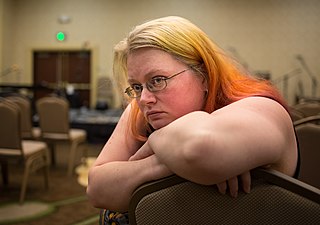A Quote by Megan Whalen Turner
Related Quotes
Believers are often thought of as people who have some kind of private conviction or repudiation of something, whereas "the faithful" refers to a relationship, which was also incidentally the earlier sense of "faith" in premodern, preliberal Christianity. This is not to say, incidentally, that "faith" refers simply to external behavior as opposed to internal belief but that it refers to an act.
If we apply the term revolution to what happened in North America between 1776 and 1829, it has a special meaning. Normally, the word describes the process by which man transforms himself from one kind of man, living in one kind of society, with one way of looking at the world, into another kind of man, another society, another conception of life.... The American case is different: it is not a question of the Old Man transforming himself into the New, but of the New Man becoming alive to the fact that he is new, that he has been transformed already without his having realized it.
I was acquainted once with a gallant soldier who assured me that his only measure of courage was this: upon the first fire, in an engagement, he immediately looked upon himself as a dead man. He then bravely fought out the remainder of the day, perfectly regardless of all manner of danger, as becomes a dead man to be. So that all the life or limbs he carried back again to his tent he reckoned as clear gains, or, as he himself expressed it, so much out of the fire.
The statesman who should attempt to direct private people in what manner they ought to employ their capitals would not only load himself with most unnecessary attention but assume an authority which could safely be trusted to no council and senate whatever, and which would nowhere be so dangerous as in the hands of man who have folly and presumption enough to fancy himself fit to exercise it.
A musician must make music, an artist must paint, an poet must write, if he is to be ultimately at peace with himself. What a man can be, he must be. This weed we call self-actualization….It refers to man’s desire for self-fulfillment, namely to the tendency for him to become actually in what he is potentially: to become everything one is capable of becoming.
The Great Man's sincerity is of the kind he cannot speak of, is not conscious of: nay, I suppose, he is conscious rather of insincerity; for what man can walk accurately by the law of truth for one day? No, the Great Man does not boast himself sincere, far from that; perhaps does not ask himself if he is so: I would say rather, his sincerity does not depend on himself; he cannot help being sincere!
For the essence of sin is man substituting himself for God [Gen. 3:1-7], while the essence of salvation is God substituting himself for man [2 Cor. 5:21]. Man asserts himself against God and puts himself where only God deserves to be; God sacrifices himself for man and puts himself where only man deserves to be.






































